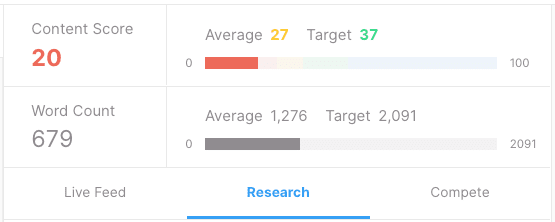Links improve rankings. But how to maximize the impact of link building? Here are four ways to do it today.
Getting links to quality websites is critical to positioning yourself well in competitive niches.
We all know.
However, simply getting links to a landing page on your website doesn't guarantee anything.
While the tools may tell you that you will need "10 links to rank in the top 10", this is generally inaccurate. In fact, it could be much more or much less.
I've worked with countless link building clients ranging from new rogue sites to DR90 companies with 7-figure marketing budgets, and one thing is for sure:
Links improve search rankings. However, there are ways to maximize your impact and ensure your efforts are successful.
1. Match Search Intent
Search intent, also known as user intent, is the goal that search engines have when they enter a query in search engines.
As a website looking to take advantage of search traffic, you need to match intent. Period.
You can't force feed links to a page that doesn't match the user's intent and expects it to be ranked in the long run. Not gonna happen.
Short term?Could be.
If you're looking at your landing page on a tool like Ahrefs and it shows you a stronger domain ranking and more unique top links / domains than sites that rank on the first page, it's a sign that you're potentially misdirecting the intention of the user.
While there may be other issues such as site age or technical hurdles, search intent should be the first step when trying to maximize link effectiveness.
The content must be useful to users, first of all. Only then will the links have a big impact on your ranking on the first page. You can't trigger and go to Google by overloading links that don't deliver value.
In addition to matching your search intent, we also recommend that you optimize your content.
That is how.
2. Optimize Content
In line with the search intent, there is content optimization, for both users and search engines.
The goal of these first two steps is to get your content or page in the best possible position to rank and benefit from a flow of links.
Without content optimized and specific to user intent, links won't move the needle.
I've seen it over and over: poorly optimized, low word count, promotional pages trying to rank for keywords with informational intent by accumulating links.
It just doesn't work.
These may seem like boring little steps, but they really make a big difference on a large scale. A small percentage of profit builds up over time, especially as your site grows.
In addition to the typical on-page SEO steps, another step I take in content optimization is to use a tool like Marketmuse or Clearscope to research content scores, word counts, and more:
These tools collect and analyze data on the pages with the highest ranking for a given keyword, topic and search engine results page.
They also provide related topics, questions, and sub-categories that you can tap into in your content to improve context, intent, and length.
Once you've optimized your content from start to finish, it's time to focus on high quality links.
3. High-Quality Link Focus
Not all connections are the same.
In fact, it's not even close.
Some links can negatively affect your search engine rankings, while others can trigger them.
For a long time it was thought that more links are inherently better because most of the top ranking pages in the SERPs have tons of links.
However, this may be a correlation, not a causation.
First, let's define what a high-quality link is:
- A link from a new and unique main domain that hasn't previously been linked to you.
- Linked from a reliable and high authority site.
- The external link domain has real, quality organic traffic with visitors in your niche.
- Linking of source links to other external sites.
- It doesn't contain any untracked, UGC or sponsored attributes (these aren't bad, they just aren't great).
There are many other factors at play here, but these are some of the most important.
When conducting awareness for the location of resources or connections in general, focus your efforts on what will have the greatest impact.
Focus your efforts on unique domains that are trusted in your niche. Domains that appear in search results and provide real and valuable authority.
4. Build up Pages You’re Linked In
So you've paired your search intent with real, valuable content. You've spent some time tweaking, optimizing, and perfecting it for both the reader and the search engines.
It has even launched successful campaigns that have generated powerful links from real, licensed websites.
What now? What more could you do?
Create the pages that link to it. The more reliable, authoritative, and connected a part is, the greater the benefits of filtering you will see.
Whenever you are mentioned or linked, you share that piece on social media to generate social signals. Use it to participate in forums and generate traffic.
Share it with your email list as a helpful resource for passively getting more attention and links. Write a guest post on a relevant topic? Use that piece as an example.
The work is far from over when new great connections are acquired. Use this as an opportunity to promote and increase the power of the page you are mentioned on.
FAQs:
#1. Is link building hard?
Regardless, links remain at the heart of Google's search algorithm, and without link building, you're leaving serious link equity on the table (no matter how good your content is). While link building is (really) difficult, it's still the most effective way to increase search visibility.
#2. What is linking strategy?
A linking strategy is a plan created and implemented that helps you organize, track, and optimize your links. With the right plan, you can see significant business gains, including increased sales and improved search engine rankings.
#3. What is backlink strategy?
Backlink strategies have been an important part of online marketing for a long time. They help improve your website's traffic, ranking, reputation and even relationships. While the effectiveness of quality backlinks to your site hasn't changed, the methods by which you get them are.
#4. Does link building still work?
It can still provide a minimal boost and is still a great overall brand awareness tactic. Guest blogging can definitely help your website grow, but it shouldn't be used as your primary link building strategy. The key to getting the most out of guest blogging is to prioritize quality and diversity.
#5. How important are backlinks for SEO?
Why are backlinks important? Backlinks are particularly valuable for SEO because they represent a "vote of confidence" from site to site.
If many sites link to the same web page or website, search engines can infer that the content is worth linking to and therefore worth showing in a SERP as well.
There are more Questions, but let it be for another article :)
Conclusion
Links are essential for good search engine rankings.
Links pointing to your content from trusted sources tell Google that you are also a trusted source.
However, you cannot expect links to lead you to victory. There are several steps before and after composing to make sure you maximize the impact of the link.
Start with matching the search intent to troubleshoot user issues and target the query in question correctly. It also optimizes intent-based content for search engines.
So focus your awareness efforts on the higher level connections that will really move the needle.
Finally, accumulate the mentions you acquire along the way to give your site more authority















Really Helpful
ReplyDelete